South Korea’s Constitutional Court has overturned the impeachment of Han Duck-soo, reinstating him as the interim leader of the country. Han had briefly served as acting president in December after President Yoon Suk Yeol was suspended from office for attempting to impose martial law during national unrest. However, just two weeks into his leadership, Han was impeached by lawmakers, accusing him of political interference. Following his removal, Deputy Prime Minister Choi Sang-mok assumed control of state affairs. The court’s decision is a significant development in a time of intense political instability.
Political Crisis Deepens After Martial Law Controversy
South Korea’s political landscape has been in turmoil since President Yoon’s controversial attempt to enforce martial law in response to national unrest. The move, which many viewed as an overreach of presidential power, led to his suspension by parliament. Han Duck-soo stepped in as the acting leader during this critical period, but his brief tenure has been marked by escalating political tension. Upon assuming office, Han blocked the appointments of new Constitutional Court judges, a move seen by many as an attempt to prevent a ruling that could favor Yoon’s impeachment.
Impeachment of Han Duck-soo
Han’s actions in blocking judicial appointments did not go unnoticed. Opposition lawmakers, who had hoped that new judges would support the impeachment of President Yoon, accused Han of undermining the independence of the Constitutional Court. This led to parliament’s decision to impeach Han, further deepening the political crisis. Lawmakers argued that Han’s interference with the court threatened the integrity of the judicial system and political stability.
Constitutional Court Ruling in Han’s Favor
In a major development, the Constitutional Court ruled seven to one in favor of Han Duck-soo, overturning his impeachment. This decision reinstates him as the acting leader of the country. After the verdict, Han expressed gratitude to the court, calling it a “wise decision.” He vowed to restore order to the government and ensure a smooth transition of power amid the ongoing unrest. Han’s return to office marks the continuation of his temporary leadership, although the country’s political future remains uncertain.
Uncertainty Looms Over President Yoon’s Impeachment
While Han’s position has been secured, the legal fate of President Yoon remains unresolved. The court must still rule on the impeachment of Yoon, which is currently in a state of legal limbo. Parliament had removed Yoon from office on December 14, but the decision is only final if the Constitutional Court approves it. If the court rejects the impeachment, Yoon will immediately resume his presidential duties, bringing an abrupt end to the uncertainty surrounding his position.
Protests Continue Across South Korea
As the country awaits a final decision on Yoon’s impeachment, protests have intensified across Seoul. Massive crowds have gathered both in support of and against Yoon’s return to office. These protests reflect the deep division within the South Korean public over the impeachment and the future of the nation’s leadership. The protests show no signs of slowing down, and the political unrest has added to the uncertainty surrounding the court’s impending verdict.
What’s Next for South Korea’s Political Future?
With Han Duck-soo’s reinstatement and the ongoing impeachment proceedings against President Yoon, South Korea remains in a state of political disarray. The Constitutional Court’s decision on Yoon’s case will be pivotal in shaping the country’s future leadership. In the meantime, South Korea’s citizens are waiting anxiously for the court’s ruling, while political protests continue to shape the streets of Seoul.
As the nation faces this unprecedented political turmoil, it is unclear when or how the situation will be resolved. However, it is clear that the country’s political system is under immense strain, and the consequences of these events will reverberate far beyond the current leadership crisis.


